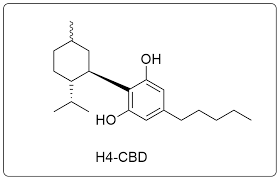H4CBD or hexahydrocannabidiol, also known as hydrogenated CBD, is a synthetic compound capable of interacting with the endocannabinoid system. In other words, it is a lab-produced cannabinoid derived from CBD using specialized chemical synthesis techniques.
Although H4CBD is gaining some popularity lately, it is important to note that this substance is not a novelty, as it has been known for over 80 years. The synthesis of H4CBD was first carried out in the 1940s, although researchers weren't interested in exploring its properties until about two decades ago, when cannabinoids began to grow in popularity due to their potential.
So, although it has been known for decades, it is only in recent years that it has begun to attract renewed interest, especially in the scientific community and those interested in the potential benefits of cannabinoids.
The process of obtaining and synthesizing H4CBD takes place by chemically modifying CBD in a laboratory, through the addition of hydrogen. This results in a slightly different molecular structure, which changes the way the parent compound (CBD) interacts with cannabinoid receptors.
It is this structural variant that distinguishes H4CBD from conventional CBD and has generated much research interest in its potential effects. The affinity of this synthetic cannabinoid for endocannabinoid receptors in the human and mammalian body has been found to be higher than that of CBD. This means that its effects are more potent.
As the scientific community delves deeper into the study of H4CBD, research is being conducted to better understand how this compound interacts with the endocannabinoid system and how it can affect different aspects of the human body.
In other words, the potential anti-inflammatory, analgesic, analgesic, anxiolytic, neuroprotective and other properties of H4CBD are being investigated. However, it is important to note that research on this compound is still in its early stages and clinical trials are needed to confirm its results.
H4CBD and HHC: similarities and differences
Both H4CBD and HHC are two compounds that have gained popularity recently due to their similarities with cannabidiol (CBD) and tetrahydrocannabinol (THC). Although both compounds are considered cannabinoids, it should be noted that they have different characteristics and effects.
First of all, their origin and chemical structure differ: while H4CBD is a synthetic derivative of CBD obtained by specific chemical modifications to this cannabinoid, HHC is naturally found in the cannabis plant in small quantities. However, HHC sold in specialty stores is usually a synthetic substance derived from THC.
Furthermore, the two compounds have different effects: H4CBD is similar to CBD, while HHC seems to have similar effects to THC but with milder effects.
In summary, although both H4CBD and HHC are synthetic compounds related to CBD and THC, respectively, they have significant differences in terms of chemical structure and effects.
Is H4CBD legal?
As with many other cannabinoids, whether synthetic or not, H4CBD, which is not listed in any law or explicitly prohibited, is considered a legal product. However, the legality of cannabinoids may vary depending on their presentation and/or form of administration, as well as the regulations applicable to each country.
Finally, it is important to note that products containing H4CBD, HHC or any other synthetic cannabinoid are not intended to diagnose, treat or cure any disease. Under no circumstances should their use be considered a substitute for appropriate medical treatment. In any case, it is always advisable to consult a physician to evaluate each specific case and follow the recommendations of your medical specialist.
